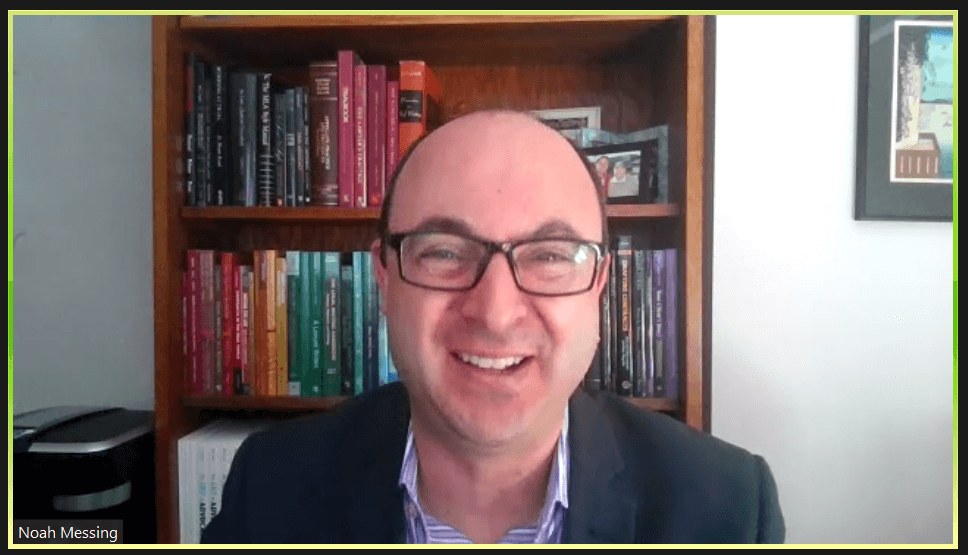
Litigation Skills Series: Legal Writing
On Thursday, April 9, 2021, Noah A. Messing, Yale Law School’s Lecturer in the Practice of Law and Legal Writing, led a legal writing workshop, the latest installation in the Washington Council of Lawyers’ Litigation Skills Series. With great skill and wit, Noah took the audience through the three main areas where lawyers can improve their writing skills: organization, prose, and drafting.
Four Key Organizational Strategies
Noah urged attendees to orient readers fast. Even if the memo or brief is inherently lengthy, try to frontload the important information; this allows the reader to quickly become familiar with the purpose of the document and determine its urgency.
While telling a narrative, it can be tempting to simply state the facts in straightforward chronological order but introducing facts using flashbacks can help better organize your writing. Doing so can allow the reader to understand why the facts the writer has presented in the past are important and relevant to their message.
Another pitfall that lawyers can easily fall into is focusing too much on rebutting their opponents’ arguments. Noah urges lawyers to focus on winning, THEN rebutting. This means not only showing the flaws in your opponents’ arguments; it means clearly demonstrating why your arguments are more persuasive and the correct way for the Court to decide.
But how does one go about creating a structure to organize all of this information? Noah introduced attendees to the idea of CRAC, which stands for Conclusion, Rule, Application, and Conclusion. This method is a simple way to ensure that your arguments and messages stay neatly organized.
Five Strategies for Better Prose
When dealing with complex issues, it can be easy for lawyers to fall into the trap of writing long and complicated sentences and paragraphs as they try to address every part of their argument. However, this can cause the reader to feel as if they were in a confusing labyrinth, quickly losing track of where the writer was trying to lead them. To combat that, Noah encourages writers to write short sentences and paragraphs. This does not mean writing curt or robotic-sounding prose; it rather means to vary the length of your sentences to ensure that your message is clear and easy to follow.
He also encourages writers to use active and short verbs. Try keeping your writing in the active voice and watch out for passive verbs. On that note, pay attention to the length of the words you choose – notice the number of syllables in the words you choose. This does not mean you have to count out the syllables in each word but rather encourages the writer to keep their language clear and concise.
Noah also encourages writers to place familiar information before new information. Start by setting a foundation for the reader, including providing who the parties are and defining unknown terms, such as names of projects. To keep the reader on track for where you want to go, use “signposts” to let the reader know where you are trying to lead them. And be sure to get to the subject of the sentence and the principal verb quickly; nothing loses a reader more than having to wade through lengthy clauses to find the point of the sentence.
Five Tips for Drafting
Anticipate issues. As the old saying goes, hope for the best, but prepare for the worst. Being a good lawyer requires one to be prepared for any and all possible outcomes, so be sure to consider additional options when listing who your messages apply to. Be sure to have all of your bases covered.
Watch for Ambiguity. Ambiguous language can be the downfall of even the best attorney. Be sure to make sure that your language is specific.
Watch for Vagueness. Notice wiggle room in the terms you write? Your opponents can use that to their advantage. Ensure that your language is not vague to allow your message to be as impactful as you mean it to be.
Watch for Inconsistencies. Even the tiniest details matter! Ensure that you are consistent throughout your writing, whether it be through how you refer to the parties or whether you capitalize certain words.
Find Good Precedent. Good writing is nothing without the precedent and the research to back it up!
Noah captivated attendees not only through these useful lessons but also with his sense of humor and his ability to present these lessons in a fun and interesting way. Using great metaphors and visual examples, attendees were able to easily grasp the skills that will help them become better writers and better lawyers.
Want to learn how to become a better litigator? Sign up for our next events in our Litigation Skills Series here.
Caitlyn Burnitis is a Staff Attorney at the Amara Legal Center and a member of the Washington Council of Lawyers Communications Committee.






